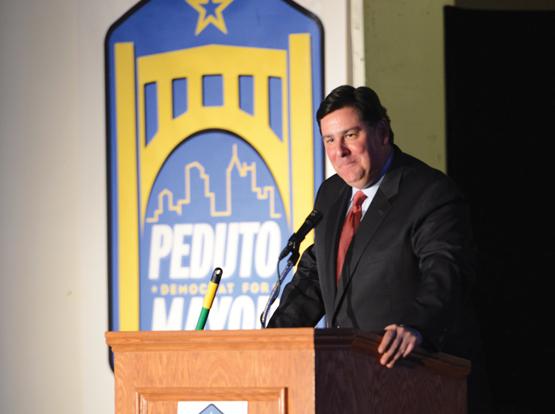Peduto wins landslide mayoral victory

Pittsburgh Mayor Bill Peduto during his campaign in 2013.
November 6, 2013
District 8 City Councilman Bill Peduto is Pittsburgh’s newest mayor after securing a widely anticipated victory in the general election Tuesday evening.
As of 11:25 p.m. more than 95 percent of the votes were counted. At this point Peduto had received 35,257 votes, or 84 percent of all votes. Former state constable Josh Wander, the Republican candidate for mayor, received 4,844 votes, or about 12 percent of the ballots cast.
Because more than 60 percent of Allegheny County’s voters are registered Democrats, Peduto’s victory yesterday evening was considered a mere formality by many.
But Wander maintained that during his campaign he wanted to remind the city, which has not had a Republican mayor in almost 80 years, that there is more than one political party.
When Peduto took the stage at 9:45 p.m. at his victory party, which was held at the Homewood Coliseum on Frankstown Avenue, he told the more than 500 supporters that his election would be the beginning of a new era for Pittsburgh.
Peduto said that former mayor David L. Lawrence and other recognizable figures in the city’s history ushered it into the “Pittsburgh Renaissance,” which he said was characterized by “big things.”
These innovators tried to build big attractions that they thought would draw people to Pittsburgh, such as a racetrack in East Liberty.
“Tonight we end the era of Renaissance,” Peduto said before the cheering audience, many of whom wore the same Peduto campaign T-shirts that were on sale near the entrance to the hall.
Instead, Peduto said he wants to build up public transit that will foster economic growth by bringing people to the center of the city.
Pitt graduate Alison Holtzman, director of finance for the Peduto campaign, said Peduto chose to hold his party in Homewood to showcase the neighborhood and demonstrate his commitment to developing it and other depressed areas.
“He wants to know what the community wants and not just have some big-money developer coming in,” Holtzman said.
Lara Sullivan, a senior adviser to Pitt College Democrats, and about 15 other members of the club attended Peduto’s victory party Tuesday night.
Sullivan, who also serves as the president of the Pennsylvania College Democrats, said that she was convinced that Peduto is committed to diversity.
”If you look around the room, there’s definitely people from all walks of life,” she said.
Low turnout
While the crowd that greeted Peduto in Homewood was enthusiastic, things were slow at Oakland polls throughout election day.
From 2:45 to 3:30 p.m., only four voters left the Engine Company No. 14 polling station on McKee Place. Turnout decreased as the day went on. Between 5:30 and 6 p.m., only two voters left the same polling station.
Ann Pasquerelli, 64, of Oakland, who voted at the polling place on McKee Street, said she voted for Peduto, though she wasn’t overly enthusiastic about his candidacy.
“He was the only one worth voting for in the primaries,” Pasquerelli said. “If anyone, I would rather have [Mayor Luke Ravenstahl] back, but that can’t happen.”
The area outside the main entrance of Soldiers & Sailors Memorial Hall, another polling station on campus, was mostly vacant around 1 p.m.
Students walked through Posvar Hall to and from classes at about 7:30 p.m. without taking notice of the polling station set up in the building.
The Allegheny County Division of Elections does not track the rates of voter turnout while elections are underway.
Mark Wolosik, the department’s manager, said that interest did not seem strong among voters Tuesday.
“The higher the turnout, the higher the voter interest, and the more people will call us asking where they can vote,” Wolosik said. “And we’re not getting very many calls.”
Tuesday’s turnout, which was about 20 percent, was lower than that of the two previous mayoral elections.
In 2009, voter turnout was about 24 percent, according to Wolosik. In 2005, it was 29 percent.
Election opponent
After the primary in May, Wander remained the last obstacle between Peduto and the city’s top executive office. Because of Pittsburgh’s status as an urban Democratic stronghold, the Democratic mayoral primary is usually considered the main hurdle for those hoping to attain the city’s top executive position.
Peduto beat out three other candidates to secure the nomination last May. Former State Auditor Jack Wagner, Peduto’s closest rival, received less than 40 percent of the Democratic vote. State Rep. Jake Wheatley of the Hill District trailed behind, with less than eight percent of the Democratic primary vote. Community organizer A.J. Richardson won less than one percent of the vote.
Pitt graduate Ian Lauer, 26, of Oakland, said he largely agreed that Peduto’s victory was inevitable as he left the polling place at Engine Company No. 14 on McKee Place.
”The primary is really where the mayor is determined,” Lauer said. “We have been transitioning power to Bill Peduto since he won the primary because it is the virtual assumption that he will win.”
Wander, who works as a security consultant, said that he has been in and out of the United States during the last few months, traveling to Israel and other countries on business.
He said that he flew in Sunday from Moscow, Russia, and on Tuesday afternoon said he visited dozens of polling stations throughout the city, including the Squirrel Hill, Oakland and Brookline neighborhoods.
Although Wander’s absence during the campaign season drew criticism from some members of the public, Wander said the attention he received proved that Pittsburgh is tired of electing a Democrat as mayor every election cycle.
“[Pittsburgh voters] miss having an opposition,” he said. “They miss having an alternative.”
Kathleen Fennell, Tim Haight, Joelle Smith and Chris Puzia contributed to this report.


